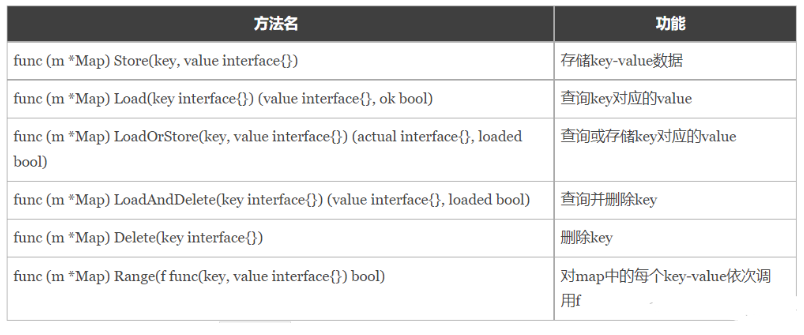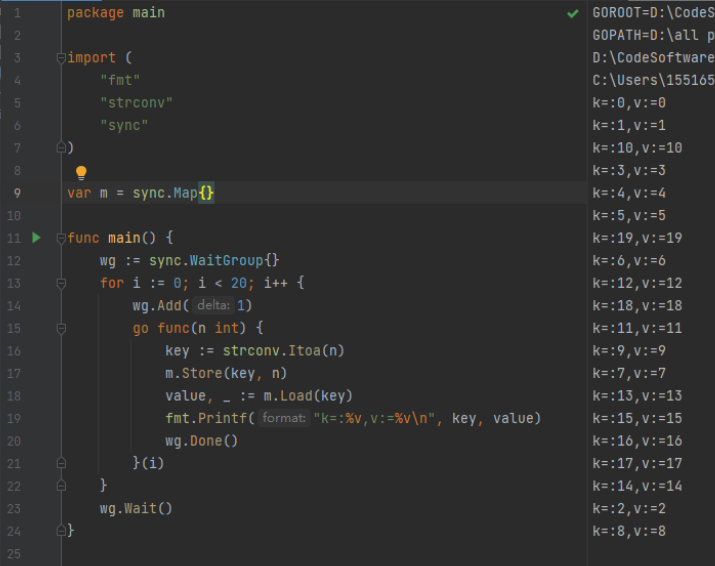GoLang之sync.Map底层
目录
1.sync.Map结构体
1.1sync.Map结构体
// Map is like a Go map[interface{}]interface{} but is safe for concurrent use
// by multiple goroutines without additional locking or coordination.
// Loads, stores, and deletes run in amortized constant time.
//
// The Map type is specialized. Most code should use a plain Go map instead,
// with separate locking or coordination, for better type safety and to make it
// easier to maintain other invariants along with the map content.
//
// The Map type is optimized for two common use cases: (1) when the entry for a given
// key is only ever written once but read many times, as in caches that only grow,
// or (2) when multiple goroutines read, write, and overwrite entries for disjoint
// sets of keys. In these two cases, use of a Map may significantly reduce lock
// contention compared to a Go map paired with a separate Mutex or RWMutex.
//
// The zero Map is empty and ready for use. A Map must not be copied after first use.
type Map struct {
mu Mutex
// read contains the portion of the map's contents that are safe for
// concurrent access (with or without mu held).
//
// The read field itself is always safe to load, but must only be stored with
// mu held.
//
// Entries stored in read may be updated concurrently without mu, but updating
// a previously-expunged entry requires that the entry be copied to the dirty
// map and unexpunged with mu held.
read atomic.Value // readOnly
// dirty contains the portion of the map's contents that require mu to be
// held. To ensure that the dirty map can be promoted to the read map quickly,
// it also includes all of the non-expunged entries in the read map.
//
// Expunged entries are not stored in the dirty map. An expunged entry in the
// clean map must be unexpunged and added to the dirty map before a new value
// can be stored to it.
//
// If the dirty map is nil, the next write to the map will initialize it by
// making a shallow copy of the clean map, omitting stale entries.
dirty map[any]*entry
// misses counts the number of loads since the read map was last updated that
// needed to lock mu to determine whether the key was present.
//
// Once enough misses have occurred to cover the cost of copying the dirty
// map, the dirty map will be promoted to the read map (in the unamended
// state) and the next store to the map will make a new dirty copy.
misses int
}
1.2Store方法
// Store sets the value for a key.
func (m *Map) Store(key, value any) {
read, _ := m.read.Load().(readOnly)
if e, ok := read.m[key]; ok && e.tryStore(&value) {
return
}
m.mu.Lock()
read, _ = m.read.Load().(readOnly)
if e, ok := read.m[key]; ok {
if e.unexpungeLocked() {
// The entry was previously expunged, which implies that there is a
// non-nil dirty map and this entry is not in it.
m.dirty[key] = e
}
e.storeLocked(&value)
} else if e, ok := m.dirty[key]; ok {
e.storeLocked(&value)
} else {
if !read.amended {
// We're adding the first new key to the dirty map.
// Make sure it is allocated and mark the read-only map as incomplete.
m.dirtyLocked()
m.read.Store(readOnly{m: read.m, amended: true})
}
m.dirty[key] = newEntry(value)
}
m.mu.Unlock()
}
1.3Load方法
func (e *entry) load() (value any, ok bool) {
p := atomic.LoadPointer(&e.p)
if p == nil || p == expunged {
return nil, false
}
return *(*any)(p), true
}
1.4LoadOrStore方法
// LoadOrStore returns the existing value for the key if present.
// Otherwise, it stores and returns the given value.
// The loaded result is true if the value was loaded, false if stored.
func (m *Map) LoadOrStore(key, value any) (actual any, loaded bool) {
// Avoid locking if it's a clean hit.
read, _ := m.read.Load().(readOnly)
if e, ok := read.m[key]; ok {
actual, loaded, ok := e.tryLoadOrStore(value)
if ok {
return actual, loaded
}
}
m.mu.Lock()
read, _ = m.read.Load().(readOnly)
if e, ok := read.m[key]; ok {
if e.unexpungeLocked() {
m.dirty[key] = e
}
actual, loaded, _ = e.tryLoadOrStore(value)
} else if e, ok := m.dirty[key]; ok {
actual, loaded, _ = e.tryLoadOrStore(value)
m.missLocked()
} else {
if !read.amended {
// We're adding the first new key to the dirty map.
// Make sure it is allocated and mark the read-only map as incomplete.
m.dirtyLocked()
m.read.Store(readOnly{m: read.m, amended: true})
}
m.dirty[key] = newEntry(value)
actual, loaded = value, false
}
m.mu.Unlock()
return actual, loaded
}
1.5LoadAndDelete方法
// LoadAndDelete deletes the value for a key, returning the previous value if any.
// The loaded result reports whether the key was present.
func (m *Map) LoadAndDelete(key any) (value any, loaded bool) {
read, _ := m.read.Load().(readOnly)
e, ok := read.m[key]
if !ok && read.amended {
m.mu.Lock()
read, _ = m.read.Load().(readOnly)
e, ok = read.m[key]
if !ok && read.amended {
e, ok = m.dirty[key]
delete(m.dirty, key)
// Regardless of whether the entry was present, record a miss: this key
// will take the slow path until the dirty map is promoted to the read
// map.
m.missLocked()
}
m.mu.Unlock()
}
if ok {
return e.delete()
}
return nil, false
}
1.6Delete方法
// Delete deletes the value for a key.
func (m *Map) Delete(key any) {
m.LoadAndDelete(key)
}
1.7Range方法
// Range calls f sequentially for each key and value present in the map.
// If f returns false, range stops the iteration.
//
// Range does not necessarily correspond to any consistent snapshot of the Map's
// contents: no key will be visited more than once, but if the value for any key
// is stored or deleted concurrently (including by f), Range may reflect any
// mapping for that key from any point during the Range call. Range does not
// block other methods on the receiver; even f itself may call any method on m.
//
// Range may be O(N) with the number of elements in the map even if f returns
// false after a constant number of calls.
func (m *Map) Range(f func(key, value any) bool) {
// We need to be able to iterate over all of the keys that were already
// present at the start of the call to Range.
// If read.amended is false, then read.m satisfies that property without
// requiring us to hold m.mu for a long time.
read, _ := m.read.Load().(readOnly)
if read.amended {
// m.dirty contains keys not in read.m. Fortunately, Range is already O(N)
// (assuming the caller does not break out early), so a call to Range
// amortizes an entire copy of the map: we can promote the dirty copy
// immediately!
m.mu.Lock()
read, _ = m.read.Load().(readOnly)
if read.amended {
read = readOnly{m: m.dirty}
m.read.Store(read)
m.dirty = nil
m.misses = 0
}
m.mu.Unlock()
}
for k, e := range read.m {
v, ok := e.load()
if !ok {
continue
}
if !f(k, v) {
break
}
}
}
2.sync.Map介绍
Go语言的sync包中提供了一个开箱即用的并发安全版 map——sync.Map。开箱即用表示其不用像内置的 map 一样使用 make 函数初始化就能直接使用。同时sync.Map内置了诸如Store、Load、LoadOrStore、Delete、Range等操作方法。

3.sync.Map并发安全使用示例























 1034
1034











 被折叠的 条评论
为什么被折叠?
被折叠的 条评论
为什么被折叠?








